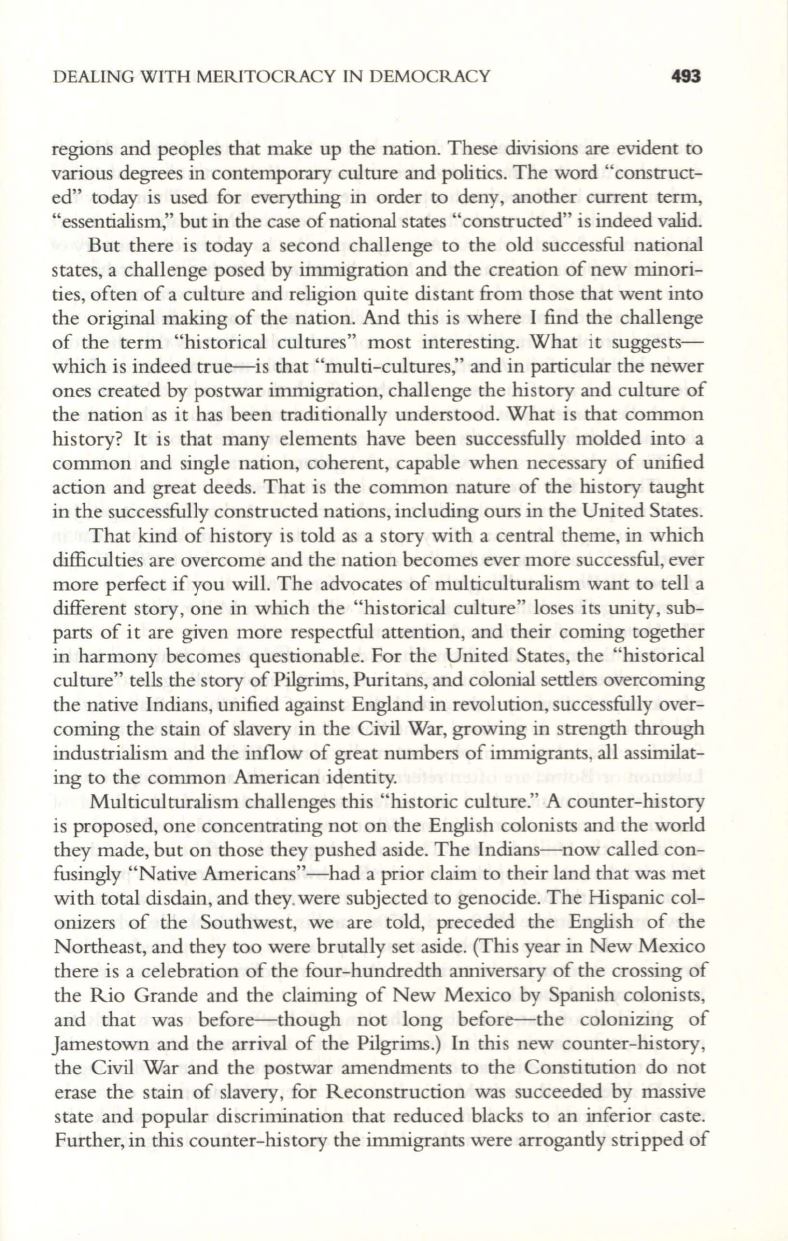
DEALING WITH MERITOCRACY IN DEMOCRACY
493
regions and peoples that make up the nation. These divisions are evident to
various degrees in contemporary culture and politics. The word "construct–
ed" today is used for everything in order to deny, another current term,
"essentialism:' but in the case of national states "constructed" is indeed valid.
But there is today a second challenge to the old successful national
states, a challenge posed by immigration and the creation of new minori–
ties, often of a culture and religion quite distant from those that went into
the original making of the nation. And this is where I find the challenge
of the term "historical cultures" most interesting. What it suggests–
which is indeed true-is that "multi-cultures," and in particular the newer
ones created by postwar immigration, challenge the history and culture of
the nation as it has been traditionally understood. What is that common
history?
It
is that many elements have been successfully molded into a
common and single nation, coherent, capable when necessary of unified
action and great deeds. That is the common nature of the history taught
in the successfully constructed nations, including ours in the United States.
That kind of history is told as a story with a central theme, in which
difficul ties are overcome and the nation becomes ever more successful, ever
more perfect
if
you
will.
The advocates of multiculturalism want to tell a
different story, one in which the "historical culture" loses its unity, sub–
parts of it are given more respectful attention, and their coming together
in harmony becomes questionable. For the United States, the "historical
culture" tells the story of Pilgrims, Puritans, and colonial settlers overcoming
the native Indians, unified against England in revolution, successfully over–
coming the stain of slavery in the Civil War, growing in strength through
industrialism and the inflow of great numbers of immigrants, all assimilat–
ing to the common American identity.
Multiculturalism challenges this "historic culture." A counter-history
is proposed, one concentrating not on the English colonists and the world
they made, but on those they pushed aside. The Indians-now called con–
fusingly "Native Americans"-had a prior claim to their land that was met
with total disdain, and they.were subjected to genocide. The Hispanic col–
onizers of the Southwest, we are told, preceded the English of the
Northeast, and they too were brutally set aside. (This year in New Mexico
there is a celebration of the four-hundredth anniversary of the crossing of
the Rio Grande and the claiming of New Mexico by Spanish colonists,
and that was before-though not long before-the colonizing of
Jamestown and the arrival of the Pilgrims.) In this new counter-history,
the Civil War and the postwar amendments to the Constitution do not
erase the stain of slavery, for Reconstruction was succeeded by massive
state and popular discrimination that reduced blacks to an inferior caste.
Further, in this counter-history the immigrants were arrogantly stripped of


